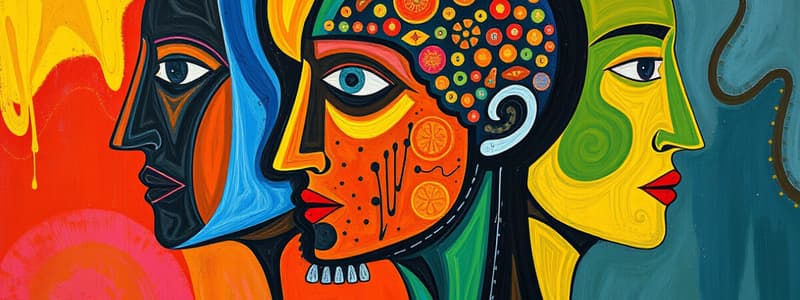Podcast
Questions and Answers
What are the three categories of self identified by William James?
What are the three categories of self identified by William James?
- Cognitive Self, Affective Self, Behavioral Self
- Personal Self, Interpersonal Self, Societal Self
- Physical Self, Psychological Self, Emotional Self
- Material Self, Social Self, Spiritual Self (correct)
Which aspect does the 'I-self' encompass according to William James?
Which aspect does the 'I-self' encompass according to William James?
- The physical attributes of an individual
- The experienced self that reflects on past experiences
- The actions motivated by self-preservation and self-seeking (correct)
- The emotional responses to social situations
How is the 'Me-self' defined in William James' theory?
How is the 'Me-self' defined in William James' theory?
- The self that reflects on its existence without any past experiences
- The phenomenal self that has experienced phenomena (correct)
- The self that is engaged in actions oriented towards society
- The self that is primarily concerned with the material aspects of life
What historical context influenced the emergence of anthropology as a discipline?
What historical context influenced the emergence of anthropology as a discipline?
What does the Material Self encompass in William James' theory?
What does the Material Self encompass in William James' theory?
Which of the following correctly describes the concept of culture?
Which of the following correctly describes the concept of culture?
What is the primary focus of physical anthropology?
What is the primary focus of physical anthropology?
Which statement accurately represents linguistic anthropology?
Which statement accurately represents linguistic anthropology?
How does culture provide an environment for individuals?
How does culture provide an environment for individuals?
What historical significance does the year 1879 hold in the field of psychology?
What historical significance does the year 1879 hold in the field of psychology?
Flashcards
Cultural Anthropology
Cultural Anthropology
Studies contemporary and past human lifestyles, including tools, food, and customs.
Archeology
Archeology
The study of past people through their artifacts.
Physical Anthropology
Physical Anthropology
Studies human biological evolution and adaptation.
Linguistic Anthropology
Linguistic Anthropology
Signup and view all the flashcards
Me-Self
Me-Self
Signup and view all the flashcards
I-Self
I-Self
Signup and view all the flashcards
Empiricism
Empiricism
Signup and view all the flashcards
Rationalism
Rationalism
Signup and view all the flashcards
Dualism
Dualism
Signup and view all the flashcards
Socrates' Unexamined Life
Socrates' Unexamined Life
Signup and view all the flashcards
Study Notes
Anthropology and Its Branches
- Cultural anthropology studies contemporary lifestyles and historical living patterns, including tools and food usage.
- Anthropology emerged from European imperialism in the 18th and 19th centuries, initially to identify cultural weaknesses for exploitation.
- Major branches include:
- Archeology: Investigates past human life through artifacts.
- Physical Anthropology: Examines human biological evolution and adaptation.
- Linguistic Anthropology: Explores language development and its influence on thought.
Psychology and the Self
- Psychology is the scientific study of behavior and mental processes, dating back to the late 19th century.
- Key concepts introduced by William James in "The Principles of Psychology":
- Me-Self: The phenomenal self, understood through experience.
- I-Self: The inner self or the self as the subject of experience.
- Self-concepts categorized into:
- Material Self: Physical aspects of identity.
- Social Self: Identity shaped by social interactions.
- Spiritual Self: Inner beliefs and values.
Philosophy and the Self
- Philosophy is recognized as the foundation of all academic disciplines, originating from the Greek terms for loving wisdom.
- Emphasizes the pursuit of knowledge beyond just sensory experience.
- Examines concepts such as:
- Empiricism: Knowledge derived from sensory experience.
- Rationalism: Innate understanding of ideal truths, independent of physical sensations.
- Dualism: Separates the mind from the body, suggesting distinct realms of existence.
Contributions of Socrates
- Socrates, regarded as the "father of Western philosophy," emphasized self-examination through reason.
- Stressed the importance of consciousness, awareness, and agency in understanding the self.
- His famous statement, “The unexamined life is not worth living,” underlines the significance of personal introspection in defining identity.
Studying That Suits You
Use AI to generate personalized quizzes and flashcards to suit your learning preferences.
Description
Explore the interrelated fields of cultural anthropology and psychology. Understand how physical processes and cognitive aspects shape human behavior, both in the present and historically. This quiz will delve into the methodologies and insights provided by these disciplines.




